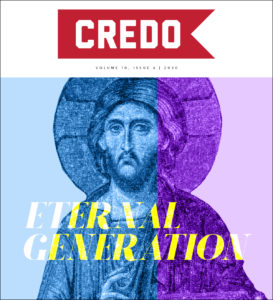The concept of eternal generation has fallen on hard times in recent theology. To be sure, it is one of the most difficult concepts in theology to understand and explain. In the modern period, many theologians have questioned its necessity, and even accuracy, for Christian doctrine. For instance, Millard Erikson has written, “The concept is either meaningless or has a tendency to lead to some variety of Arianism.”[1] Likewise, William Lane Craig has written, “For although credally affirmed, the doctrine of the generation of the Son (and the procession of the Spirit) is a relic of Logos Christology which finds virtually no warrant in the biblical text and introduces a subordinationism into the Godhead which anyone who affirms the full deity of Christ ought to find very troubling.”[2] Further, Bruce Ware once argued, “The conceptions of both the ‘eternal begetting of the Son’ and ‘eternal procession of the Spirit’ seem to me highly speculative and not grounded in biblical teaching.”[3] Though he would affirm the idea of generation and procession, Ware once argued that these concepts applied to the incarnation and the giving of the Spirit at Pentecost.
What is eternal generation?
Just what is it that these theologians are rejecting? Eternal generation (along with eternal procession) was a concept developed in the early church to explain the relations between the Father, Son, and Spirit against the doctrines of the Arians, who taught that the Son was a created being in time and less than God, the Sabellians, who argued for a kind of modalism where one God takes on various roles, and polytheism, where there are in fact three gods. These early theologians desired to maintain the eternal equality of the Persons while also maintaining the oneness of the Godhead. In the end, they argued that the Son was of the same substance with the Father. This language has been nearly universally adopted by modern theologians, even those who dismiss eternal generation.
So what is eternal generation and what does it do for this doctrine? Essentially, eternal generation is the doctrine that the Son is true Son of the Father by virtue of being from the Father. However, contrary to the doctrine of the Arians, who maintained on this basis that “there was a time when the Son was not,”[4] this is an eternal begetting and not one in time. As Keith Johnson has written, “This doctrine teaches that the Father eternally, necessarily, and incomprehensibly communicates the divine essence to the Son without division or change so that the Son shares an equality of nature with the Father yet is also distinct from the Father.”[5]
This language would become enshrined in the creeds, such as the Caesarean, Nicene, and Athanasian Creeds. For example, the Nicene Creed states, “We believe in one God the Father… and in one Lord Jesus Christ, the Son of God, begotten of the Father, only-begotten, that is, of the substance of the Father, God of God, Light of Light, true God of true God, begotten not made, of one substance with the Father.”[6]
What is the problem with this doctrine?
When theologians question eternal generation, they typically level one of two criticisms. First, they argue that the concept itself is incoherent. What does it mean for a divine Being to be generated eternally? When we consider the concept of generation, we cannot help but think creation in time. And yet, this is not how the early church understood this doctrine. They taught that this was true generation, but eternal.
Second, they argue that the concept leads to heretical conclusions. If the Son is generated from the Father, then how does it not follow that he is ontologically, as well as economically, less than the Father? Once again, however, the early church was able to maintain both eternal generation and eternal ontological equality.
Where is eternal generation in scripture?
There are numerous places in which the early church found support for this doctrine. Proverbs 8:25, Psalm 2:7, with Hebrews 1:3-5, and John 1:18 are cited frequently throughout their writings. In these texts, Jesus is identified as the begotten Son, begotten before the ages began. It is true that recent scholarship has argued that the New Testament term for “only begotten” is better translated as “one of a kind.” However, this does not end the issue. Even if it were true, and Charles Lee Irons has recently and ably argued that there are still good reasons to maintain the translation of “only begotten,”[7] one would still need to explain how it is that the Son has come to be of the same kind as the Father. After all, that is what it means to be begotten!
Further, this doctrine is expressed in numerous titles and descriptions of the Son throughout Scripture. He is called the Word of God, the Wisdom of God, the Power of God, and the Light of God. This imagery is used to highlight that the Son is essential to who God is and that he comes from God. God, as the early church taught, cannot be without his Word, Wisdom, Power, and Light and thus, the Son must be eternally from God. God, as the early church taught, cannot be without His Word, Wisdom, Power, and Light and thus, the Son must be eternally from God. Click To Tweet
The most explicit and commonly referenced text, however, is John 5:26, in which Jesus stated, “For just as the Father has life in Himself, even so He gave to the Son also to have life in Himself.”[8] In this passage, Jesus taught that, in some way, the Son’s life is granted to him from the Father. How this works he doesn’t say. But this granting is intrinsic to the inner life of the Trinity.
Why is eternal generation necessary?
The doctrine of eternal generation is seen throughout the writings of the early church. Why is this the case? For them, eternal generation not only derived from Scripture itself, but it did theological work. It had explanatory power for the critical doctrines of the deity and distinction of the Son. When the early church affirmed that the Father is unbegotten, the Son is begotten (or generated) and the Spirit proceeds, this helped to explain two realities.
First, eternal generation explains how the Son is truly God. When the early church attempted to defend the deity of the Son, they did so by affirming he is of one essence, or substance, with the Father. But how can two Persons be of one essence? Eternal generation! Because the Son is, in some sense, eternally from the Father’s essence, he is of the same nature as the Father, the way a human son is of the same nature as his father. Thus, the Son is homousia, or “of the same substance” and not homoiousia, or “of a similar substance.” He is omnipresent, omnipotent, omniscient, faithful, holy, and eternal because he is from the Father and shares his nature. Because the Son is of the same substance as the Father as his Word, Wisdom, Power, and Light, He too is God.
Second, eternal generation explains how the Son is Son and not Father or Brother. It is common today to cite authority structures within the godhead as the means of differentiating the Persons, such that the Father is Father by virtue of his being over the Son and the Son is Son by virtue of obeying the Father. While this may be common today, it is decisively not how the early church distinguished the Persons, nor is it how the major theologians through church history did so. The Son is true Son by virtue of being from the Father, as Athanasius argued when he wrote,
For the Father and the Son were not generated from some pre-existing origin, that we may account them brothers, but the Father is the Origin of the Son and begat Him; and the Father is Father, and not born the Son of any; and the Son is Son, and not brother. Further, if He is called the eternal offspring of the Father, He is rightly so called.[9]
What makes the Son the Son is that he is from the Father and is of his essence. This generation is eternal, so he is not inferior in nature as a creature, and is internal to God, so it does not result in a second God. It is this begottenness that distinguishes the Son from the Father.
John of Damascus would later write as well, “For each one of them is related as closely to the other as to itself; that is to say that the Father, the Son, and the Holy Spirit are one in all respects, save those of not being begotten, of birth and of procession.”[10] Other theologians, such as Augustine and Aquinas, would likewise affirm that these relations of origin and personal properties alone are what distinguish the Son from the Father. It can only be this way for a timeless, eternal Being. Actions, such as submission, cannot distinguish the Persons because actions are time dependent. Thus, each Person’s personal property and relation of origin are their distinguishing marks.[11]
Modern theologians who wish to jettison Eternal Generation are essentially wanting to go to the moon but rejecting rocket ships. Click To TweetThough they did not pretend to understand it fully, the early church theologians and theologians through church history held to eternal generation because it explained how other doctrines, such as the deity and distinction of the Son worked. Modern theologians who wish to jettison this concept are essentially wanting to go to the moon but rejecting rocket ships.
Eternal generation is the way Scripture and the early fathers affirmed that the Son is equal in nature to the Father without being two separate gods and it is the way the Son is Son to the Father and not Brother. The Son is divine because he shares the substance of the Father, he is Son and not Brother because he is from the Father, and he is not a separate deity because this generation occurs within the one being of God. It is good that modern theologians affirm that the Son is truly divine and is not the Father. But don’t forget, you have to get there somehow!
Endnotes
[1] Millard J. Erickson, Who’s Tampering with the Trinity?: An Assessment of the Subordination Debate (Grand Rapids, MI: Kregel Publications, 2009), 251.
[2] William Lane Craig, “Is God the Son Begotten in His Divine Nature?,” TheoLogica: An International Journal for Philosophy of Religion and Philosophical 3, 1 (2019): 22–32.
[3] Bruce Ware, Father, Son, And Holy Spirit: Relationships, Roles, And Relevance (Wheaton, IL.: Crossway Books, 2005), 162.
[4] Arius, “The Letter of Arius to Eusebius,” in Documents of the Christian Church, ed. Henry Bettenson, Second (Oxford University Press, 1963), 39.
[5] Keith E. Johnson, “What Would Augustine Say to Evangelicals Who Reject the Eternal Generation of the Son?,” The Southern Baptist Journal of Theology 16, 2 (2012): 26.
[6]Henry Bettenson, ed., “The Creed of Nicaea,” in Documents of the Christian Church, Second (Oxford University Press, 1963), 25.
[7] See Christopher Lee Irons, “A Lexical Defense of the Johannine ‘Only Begotten,’” in Retrieving Eternal Generation, ed. Fred Sanders and Scott R. Swain (Grand Rapids, MI: Zondervan Publishing House, 2017), 98–116.
[8] Scripture taken from the NEW AMERICAN STANDARD BIBLE, © Copyright The Lockman Foundation 1960,1962, 1963, 1968, 1971, 1972, 1973, 1975, 1977, 1988, 1995. Used by permission.
[9] Athanasius, “Four Discourses against the Arians,” in Nicene and Post-Nicene Fathers, ed. Archibald Robertson, vol. 4, 14 vols., Second (Peabody, MA: Hendrickson Publishers, 2012), 314.
[10] John Of Damascus, “An Exact Exposition Of The Orthodox Faith,” in Nicene And Post-Nicene Fathers, trans. S.D.F. Salmond, vol. 9, 14 vols., Second (Peabody, MA: Hendrickson Publishers, 2012), 10.
[11] St. Thomas Aquinas, Summa Theologica, trans. Fathers Of The English Dominican Province, vol. 1, 5 vols. (Notre Dame, IN: Christian Classics, 1948), 208.



